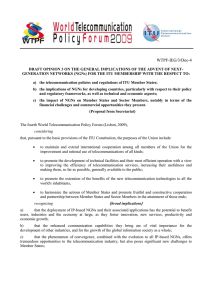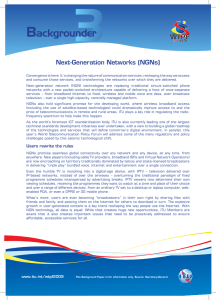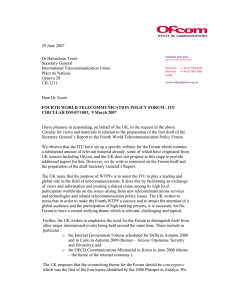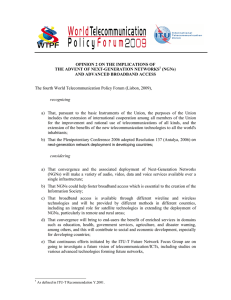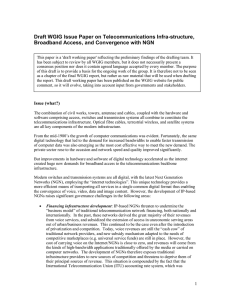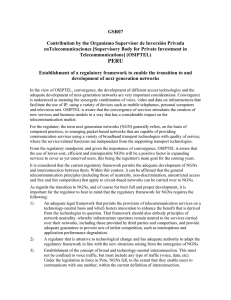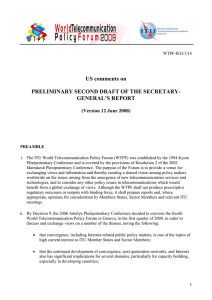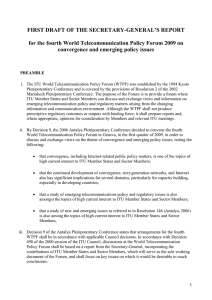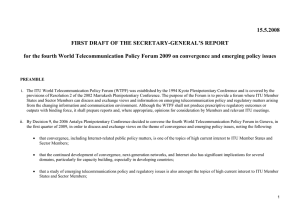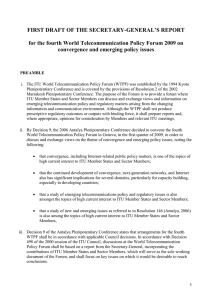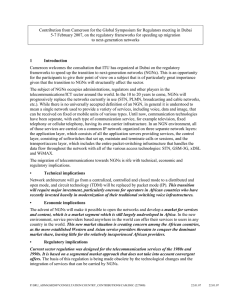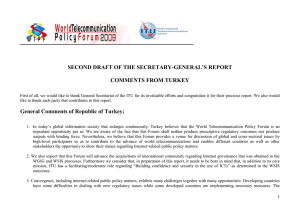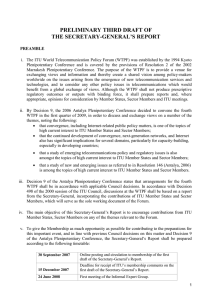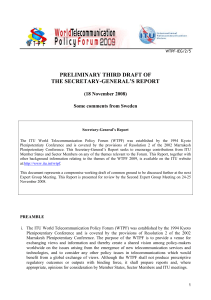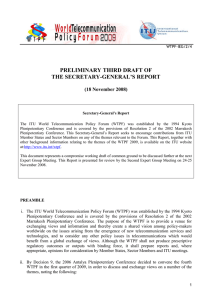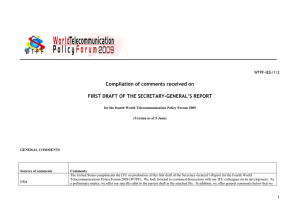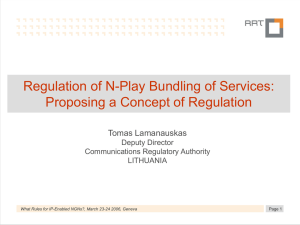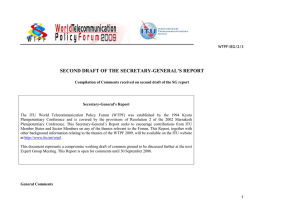B ackgrounder Convergence, including Internet-related Public Policy Matters
advertisement
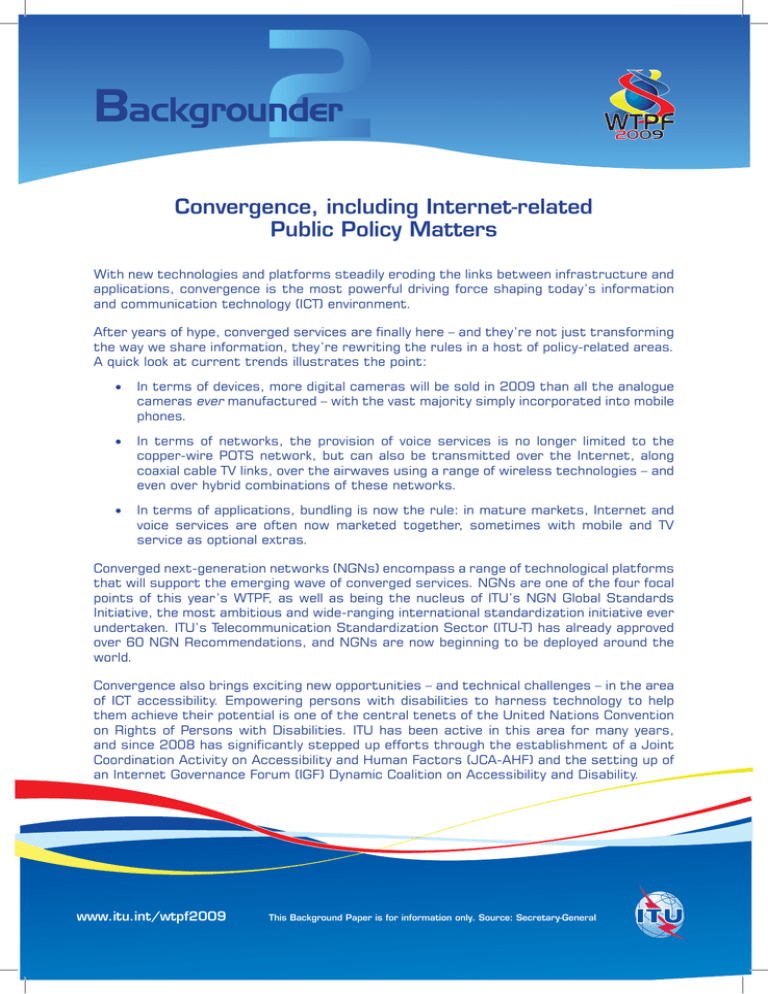
Backgrounder Convergence, including Internet-related Public Policy Matters With new technologies and platforms steadily eroding the links between infrastructure and applications, convergence is the most powerful driving force shaping today’s information and communication technology (ICT) environment. After years of hype, converged services are finally here – and they’re not just transforming the way we share information, they’re rewriting the rules in a host of policy-related areas. A quick look at current trends illustrates the point: • In terms of devices, more digital cameras will be sold in 2009 than all the analogue cameras ever manufactured – with the vast majority simply incorporated into mobile phones. • In terms of networks, the provision of voice services is no longer limited to the copper-wire POTS network, but can also be transmitted over the Internet, along coaxial cable TV links, over the airwaves using a range of wireless technologies – and even over hybrid combinations of these networks. • In terms of applications, bundling is now the rule: in mature markets, Internet and voice services are often now marketed together, sometimes with mobile and TV service as optional extras. Converged next-generation networks (NGNs) encompass a range of technological platforms that will support the emerging wave of converged services. NGNs are one of the four focal points of this year’s WTPF, as well as being the nucleus of ITU’s NGN Global Standards Initiative, the most ambitious and wide-ranging international standardization initiative ever undertaken. ITU’s Telecommunication Standardization Sector (ITU-T) has already approved over 60 NGN Recommendations, and NGNs are now beginning to be deployed around the world. Convergence also brings exciting new opportunities – and technical challenges – in the area of ICT accessibility. Empowering persons with disabilities to harness technology to help them achieve their potential is one of the central tenets of the United Nations Convention on Rights of Persons with Disabilities. ITU has been active in this area for many years, and since 2008 has significantly stepped up efforts through the establishment of a Joint Coordination Activity on Accessibility and Human Factors (JCA-AHF) and the setting up of an Internet Governance Forum (IGF) Dynamic Coalition on Accessibility and Disability. www.itu.int/wtpf2009 This Background Paper is for information only. Source: Secretary-General Like all advances, convergence brings new challenges, as well as benefits. The expected 1,000 delegates to this year’s World Telecommunication Policy Forum will explore the most pressing issues and approaches that could help the global community chart a common course forward. Internet-related public policy matters Convergence also throws up new challenges in the highly charged area of Internet governance. The crux of today’s Internet governance debate centres on the management of critical Internet resources, and in particular the management of Internet top-level domains, the allocation of Internet protocol addresses, management of security in the Domain Name System, and the regulations stipulating who defines the associated rules. With Internet demographics changing rapidly and some developing countries stating they are under-represented in current governance mechanisms, there is a need for discussions on improved global frameworks that bring a multilateral approach to the management of this increasingly vital resource. Without a model that extends the principles of democracy to the online world and rewrites the rules of globalization so that its benefits are more equitably distributed, some argue that we risk a meltdown in cyberspace. Other important issues that may be touched on during Forum debates include: the cost of international Internet connectivity and the need to promote Internet Exchange Points (IXPs) in the developing world; ongoing efforts to extend the diversity of scripts and character sets to support Internationalized Domain Names, to promote cultural diversity and the development of local content; and strategies that can help create the enabling environment crucial to the development and deployment of Internet infrastructure and services, particularly in the developing world. As a neutral and impartial international organization, ITU is working hard to build consensus in this sensitive domain, and to ensure that future outcomes benefit all the world’s people. For many years a highly contentious issue, Internet governance looks set to fuel some of the Forum’s most vigorous and heated debates. International Telecommunication Union Place des Nations CH-1211 Geneva 20 – Switzerland
